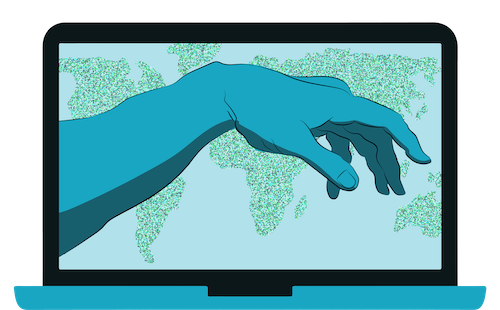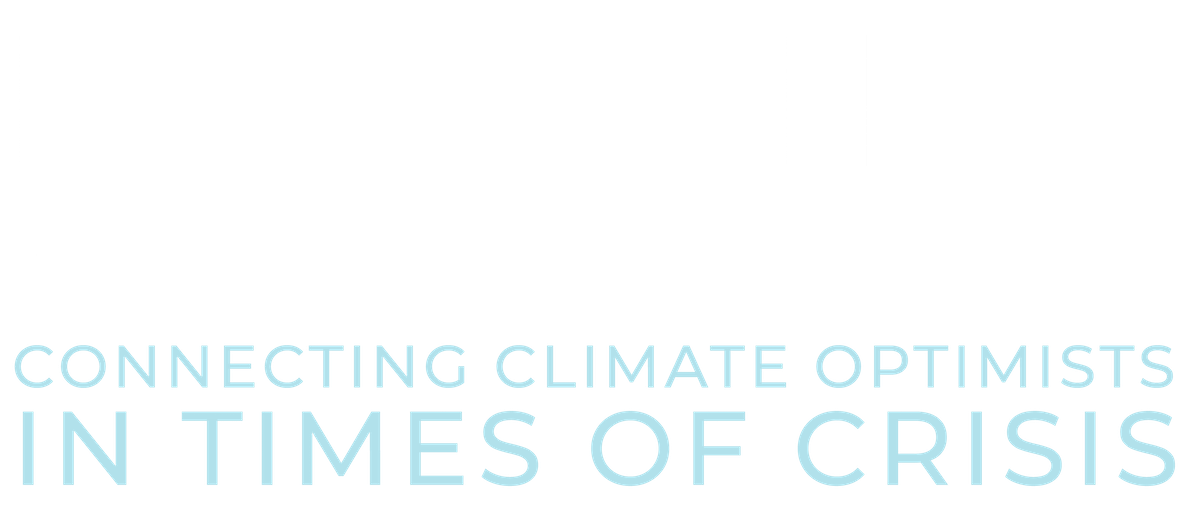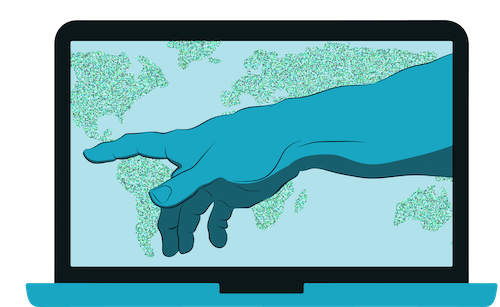



The coronavirus crisis has changed the world over the course of a few weeks. For movement builders and advocates, it presents the challenge of how to help those suffering today — while not leaving behind those other issues we care deeply for.
We want to bring our community closer together virtually, through a new series of webinars that focuses on bringing you the stories of people committed to creating a livable and equitable future for life on this planet — those working every day to ensure we find ourselves on the other side of the climate crisis.
If you are interested in participating (or know someone who would be) please reach out at mvolano@climate-xchange.org.

Our series has concluded, but we will continue our monthly Deep Dive Webinars.

Bruce Friedrich on Transitioning Away from Animal Agriculture and the Future of Alternative Protein
Co-founder and Executive Director at the Good Food Institute
Bruce Friedrich is the Co-founder and Executive Director at the Good Food Institute, an organization working with scientists, investors and entrepreneurs to spur innovation on clean meat and plant-based alternatives to animal products. In this webinar, we talk with Bruce about the transition away from animal agriculture, and toward a future of alternative protein.
Dr. Hayley Schiebel on the Role of Salt Marshes in Climate Change
Environmental Scientist & Professor, Suffolk University’s Center for Urban Ecology & Sustainability
Dr. Hayley Schiebel is an Environmental Scientist and a professor within Suffolk University’s Center for Urban Ecology and Sustainability. After completing her PhD studying dissolved organic carbon cycling in New England salt marshes at the University of Massachusetts Boston, she went on to become a postdoctoral fellow at Brown University and engaged in research investigating nitrogen isotopes in rainwater in both the Atlantic and Pacific Ocean basins. Currently, Schiebel and researchers at Brown are conducting an NSF funded study to compare levels of man-made nitrogen in atmospheric aerosol and rainwater samples along the coastlines of Oahu, Hawaii, and Chang-Dao Island, China to assess the impact of human activity on ocean and atmospheric health. Schiebel has also started a robust research group at Suffolk focused on the role of salt marshes in climate change.
Megan Milliken Biven on Orphan Wells and Greenhouse Gases
Decarbonization Consultant & Writer
This webinar features Megan Milliken Biven, a Decarbonization Consultant and writer, with an expertise on energy management and government. Megan is currently working with environmental groups on a bill that ties in increased enforcement for abandoned well monitoring, while ensuring that there is a moratorium on building residences on former oil and gas sites.
Nancy LaPlaca, J.D.on Public Utilities and Clean Energy Transitions
Energy Consultant
This webinar features Nancy LaPlaca, J.D., an Energy Consultant with decades of expertise in public policy, strategic planning and management. Nancy has twelve years of direct experience in utilities regulation, including four years as Policy Advisor to an elected state commissioner. She was an intervener for three years at the Colorado Public Utilities Commission where she promoted clean energy including solar, wind, energy efficiency, hybridization of renewable energy with conventional generation, and monetization of externalities; and helped to derail a “clean” coal plant.
Nancy served as staff co-chair to the Energy and Resources and the Environment Committee of the National Association of Regulatory Utility Commissioners for two years; served on the Scenario Planning Steering Group, a subcommittee of the Western Electricity Coordinating Council; and was a member of the Solar Securitization Task Force at the National Renewable Energy Lab.
Lars Holger Pilø on Archeological discovery through ice melt
Editor, Secrets of the Ice
Visit the website
The Earth is warming, the ice is melting, and archaeological discoveries, preserved by the ice, are being made. In recent years the melting of mountain and alpine ice and glaciers has accelerated and the number of archaeological finds recovered from the melting ice is rising. Secrets of the Ice is the resulting collaboration between the county municipality and the Cultural History Museum in Oslo to secure archaeological finds resulting from glacial melt
Eduardo López on Utilizing Solar Power in Communities Around the World
Colombia Director, GivePower
This webinar featured Colombia Country Director of Give Power, Eduardo López. GivePower is a non-profit organization that develops solar power and storage installations in developing regions. As of 2018, GivePower had installed 2650 solar power installations in villages through seventeen different countries for institutions like primary schools and medical clinics. Once installations are completed, GivePower transfers the maintenance and running of them to local communities. In 2016 GivePower began developing desalination technology that could be exported to developing regions.
Bill McKibben on The Nature of Crises & The Downfall of Giants: Is Oil (Finally) Past its Peak
Author and Environmental Advocate
For this week’s webinar, we are thrilled to be joined by author and environmental activist Bill McKibben. In 2008, Bill founded 350.org, an organization focused on bringing together a movement to end fossil fuels, build community resilience, and address environmental justice issues at their roots. As the world draws more and more parallels between the COVID-19 and climate crisis, his message of equity and justice in the climate fight holds even more truth as we work towards solutions that effectively combat both crises simultaneously. He also currently has a weekly column for The New Yorker.
American Society of Adaptation Professionals on Adapting to New Climate Realities Around the U.S.
Allegra Wrocklage, Program Manager for the Conservation Finance Network (CFN)
Antonio Butts, Executive Director, Walnut Way Conservation Corp.
Rachel Jacobson, Deputy Director, American Society of Adaptation Professionals
Moderated by the American Society of Adaptation Professionals, this week’s webinar features two speakers discussing how we can adapt to a new climate reality in the US.
Allegra Wrocklage is the Program Manager for the Conservation Finance Network (CFN), supporting public, private, and nonprofit professionals working in conservation finance. Antonio Butts, Executive Director, Walnut Way Conservation Corp., is a catalytic leader who is passionate about transforming economically excluded communities into neighborhoods of health and prosperity. Rachel Jacobson is a cross-sector collaborator with over a decade of experience in the climate adaptation, resilience, and environmental fields. As Deputy Director at the American Society of Adaptation Professionals (ASAP), she leads the development, implementation, and continuous improvement of ASAP’s programs to promote peer learning, advance effective adaptation practice, and build cohesion across the field of climate change adaptation.
Maddy Orr on Understanding Climate Change Through Sport
Founder & Co-Director of The Sport Ecology Group, Assistant Professor at SUNY Cortland
Madeleine is the Co-Director of the Sport Ecology Group and an Assistant Professor of Sport Management at State University of New York, Cortland. Her research focuses on the relationship between sport and the natural environment with special attention to climate change, risk, adaptation, sustainability, and inclusivity.
Scott Clavenna on Media and the Climate Crisis
Former CEO and Co-Founder, Greentech Media
Most recently, Scott Clavenna served as Chairman of Wood Mackenzie Power & Renewables, where he contributed to the strategic guidance of Wood Mackenzie’s work in the global energy transition. Prior to Wood Mackenzie, Mr. Clavenna was the co-founder and CEO of Greentech Media and helped develop it into the leading source of integrated news, industry research, conferences and executive councils in the clean energy economy. Greentech Media was acquired by Wood Mackenzie in 2016 and in the subsequent 4 years achieved all the goals of the acquisition while expanding its reach and breadth through its integration with acquired organizations and Wood Mackenzie’s power markets and energy transition groups.
Sam Teicheron Restoring Our World’s Dying Reefs
Co-Founder and Chief Reef Officer for Coral Vita
Sam Teicher is the Co-Founder and Chief Reef Officer of Coral Vita, an organization dedicated to coral reef restoration. Coral Vita creates high-tech coral farms that grow corals up to 50x faster while boosting their resiliency against the warming and acidifying oceans that threaten their survival. Their farms also function as education centers for local communities as well as eco-tourism attractions. They can scale to make a significant ecological difference, with a single farm able to grow millions of resilient corals for distribution around a region.
Danny Faber on the Future of Climate Action Through Justice
Professor of Sociology, Director of the Northeastern Environmental Research Collaborative
Our first webinar in our series, Bridging the Virtual Gap, features Daniel Faber, Professor of Sociology and Director of the Northeastern Environmental Research Collaborative, for a discussion about climate and environmental justice. He discusses the disparate impacts of the climate crisis, the need for urgent action, and how to best continue the work and change power dynamics as we envision the future of climate action through the inextricable lens of justice.
